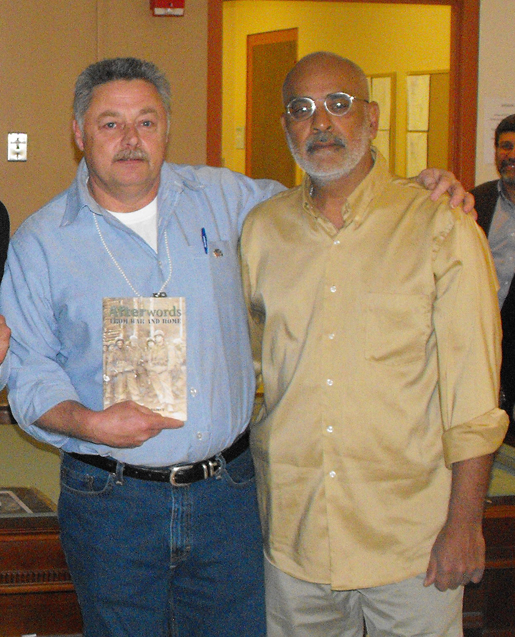David Surface, who has led writing workshops in public schools and social service settings for over twenty years, blogs about P&W–supported writing workshops with Veterans in Westchester, New York. He is the founder of the Veterans Writing Workshop, which runs free writing workshops for U.S. veterans.
I first met Frank at the Common Ground Residence for Homeless Veterans in Montrose. I was there to start a ten-week creative writing workshop funded through the Readings/Workshops program at Poets & Writers. Frank’s pale blue eyes were intense and attentive. He was interested but expressed doubt about his writing abilities. I assured him that he already had everything he needed to write a good story—all we needed to do was to help him get it down on paper.
I later learned that Frank had just graduated from the Post Traumatic Stress Disorder (PTSD) Program, and his counselor had recommended that he participate in the writing workshop. “She thinks it’ll be good for me,” he said.
Not all veterans’ traumas happen on the battlefield. Frank’s had happened during his service in the Military Police at a U.S. Naval Air Station base, though exactly what happened was unknown to the rest of us.
For the first few weeks, Frank wrote about struggling to fit in with the culture of the Naval base; his discomfort with guns, his poor performance on the firing range, the “liquid debriefs” with the other MPs, and their nightly drunken jackrabbit hunts.
"They would pull a patrol car up in front and point the high beams and spotlights at the dusty and sparse vegetation. Then these guys would shoot at the jackrabbits that were hopping around; creating puffs of dust as the rabbits scattered to get away."
Week after week, Frank continued to work his way toward the incident he’d come to the workshop to write about. I never pushed him. This was not, as I’d explained, a “writing therapy” group—this was a writing workshop, and our goal was to create the very best stories we could write.
Finally, Frank brought in the pages he’d struggled so hard to complete. With his friend Eddie’s hand on his shoulder for support, Frank read to us about the day he’d gone out on a call to search for a missing child.
"After ten minutes that felt like ten hours, I decided to go into the house myself. As I walked up the steps, something at the left of the entrance caught my eye. It was a medium-sized Coleman cooler with the lid closed. I walked up to the cooler and opened it up on a hunch. To my shock and dismay, the little boy was in there, his ball lying right next to his hand. The odor was overwhelming and his skin was clammy and grey. Instinctively, I reached into the cooler and pulled him out."
Taking deep, shaky breaths between words, Frank read about his unsuccessful attempts to revive the child, his subsequent realization that he could no longer be a policeman, and the hard-won wisdom he’d come away with.
"It would be years before I accepted the fact that there was not anything I could have done to prevent that child from dying like that. As I look back now, I realize that there are things that happen in life that you cannot control."
Watching Frank read that story for us was the bravest thing I’d ever seen—until two weeks later when I saw him stand up in front of a large audience at a public reading and do it again. Afterwards when I asked him how he felt, he wiped the sweat from his brow, grinned and said, “Great!”
I’ve seen Frank read that story three more times in public. Every time, it’s like watching someone climb the highest, most difficult mountain in the world to end up on top. It’s not easy, but, as Frank will tell you, it’s well worth the climb.
Photo: (Left) Frank Muer and fellow workshop participant Eduardo Padilla. Photo Credit: Howard Charton.
Support for Readings/Workshops in New York is provided, in part, by public funds from the New York State Council on the Arts, with additional support from Friends of Poets & Writers.





